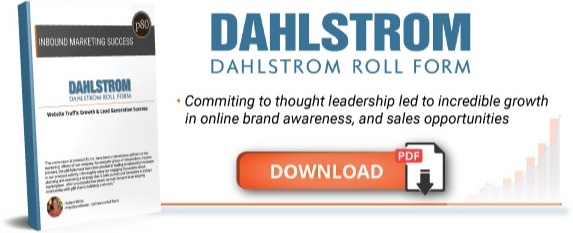Inbound Marketing Blog
for Manufacturers and Healthcare Companies
B2B Inbound Marketing Agency Breakup? How You Failed Your Partnership
(Editor’s note: This is Part 1 in a two-part series about how a relationship with an inbound marketing consulting firm can fail. Don’t worry -- in Part 2 of this series we’ll lay out all the reasons your agency could be at fault.)
Dear Inbound Marketing Clients ...
All of you have good intentions when you first seek guidance from an external marketing agency. Kudos for being forward-thinking enough to try a new approach to marketing and business -- many marketing heads or CEOs lack the guts to do that.

Unfortunately, a limited or misinformed understanding of marketing -- or the role of an agency -- can result in you gaining little or no value from the relationship.
While we’ve seen many, many client-agency relationships succeed wildly, we’ve also seen many sputter or end. More often than not, the culprits are self-inflicted wounds on the client’s part that bring us to literal tears of frustration. (Believe me; I’ve seen it several times.)
That’s what makes the best inbound marketing services special -- virtually every peer I’ve met in this line of work genuinely cares about your success. So please forgive us if we vent a little about how your marketing decisions (or indecisions) can hurt your company.
If you’ve broken up with or are currently not succeeding with your B2B inbound marketing agency, and you fit any of the five criteria below, you may be at fault. We’ll use five “real-life” examples of unsuccessful clients/bosses (OK, they’re mostly fictional, and one is Michael Scott) to show how you can enjoy a happier, more profitable agency partnership.
5 Ways to Lose a B2B Inbound Marketing Agency
There are five primary ways a client can bring doom to a digital marketing strategy -- along with the agency hired to execute it:
- The Impatient Client
- The Wandering-Brain Client
- The Faithless Client
- The Red-Tape Client
- The Ghost Client
Even worse, they can all feed off each other to poison your relationship and halt your company’s growth.
1. The Impatient Client
Famous Example: Darth Vader (“Star Wars” series)
There’s no Jedi mind trick that makes B2B content marketing succeed overnight.
Don’t place unrealistic expectations on your marketing and sales teams. Remember, content marketing’s growth compounds over time. “It’s a marathon, not a sprint” is so cliche, but so true. Any digital marketing agency that promises instant results is, well, probably lying to you.
Why so? For starters, it takes time and effort to create all that content and get you ranking on Google.
Take landing pages as an example: These pages are where you offer an e-book, whitepaper, consultation, etc. in exchange for the visitor’s contact info (thereby making them a lead). The more landing pages your agency creates over time, the more leads you’ll get.
Then there’s the phenomenon of “compound blogging.” Like a snowball rolling uphill, your most successful blog posts will collect exponentially more traffic and leads when they’re 1 or more years old.
(Graph courtesy HubSpot)
Did you know that at least 60% of all blog traffic arrives after the first month of publishing? If you build it, and it’s good -- and you use SEO best practices -- they will come.
As such, many self-respecting inbound marketing companies will say “Thanks, but no thanks” if you propose a partnership with an extremely short timeframe for success.
Before you set benchmarks for success, ask yourself -- have you gotten results anywhere close to that in the past? If you can’t understand that content is a long-term investment, then any inbound marketing campaign your agency creates is sure to fall short (in your eyes).
Finally, forcing your agency to constantly justify its existence -- i.e. frequent agency reviews, arguing over time/money spent on projects -- may force us to fire you before you fire us. As Darth Daddy once said ... we find your lack of faith disturbing. (More on that in #3.)
2. The Wandering-Brain Client
Famous Example: Michael Scott (“The Office”)
We love that you’re psyched! Keep up that enthusiasm! Just, please, stick to the plan.
Have you ever sucked up ⅔ of a meeting blurting out your vision for a previously undiscussed idea (or, in Michael’s case, making “That’s what she said” jokes)? Ideas are great, but not when they’re based on zero strategy or data, and not when we haven’t even finished what was “due” last July.
Consider all the planning a B2B content marketing agency puts into just the first 3-month stretch of a campaign:
- Auditing every content marketing effort you’ve made in the past
- Auditing your website for user experience and search engine rankability
- Researching keywords to learn how your buyers are talking about your product/service
- Brainstorming educational topics for blog posts, videos, whitepapers, etc. that’ll turn your traffic into customers
- Organizing all marketing activities into a calendar -- new blog posts, new website pages, revamped blog posts and webpages, SEO/PPC campaigns, video production, social media, email campaigns, etc.
- Tracking and measuring all of this so we can do it even better next time
Did you do all that before you shared your idea?
So, yes, when your account manager starts to present a Q2 strategy, and 30 seconds in you interrupt with, “Actually, I had this great idea instead …” she gets a little frustrated. And, more importantly, it can keep the agency from reaching the growth goals you all agreed upon when you signed the contract.
The most successful clients stick to a quarterly content strategy map, only deviating for special circumstances. Planning out marketing activities every 3 months is a perfect balance -- spaced out enough for efficiency’s sake, but brief enough that your agency can shift tactics if something’s not working.
We’ve kept Client Example #1 lighthearted so far, but this one can get ugly if the client constantly demands work outside the agreed scope of the contract. If you ignore estimates for the overages, and the work comes in late or with a higher-than-usual bill, don’t blame your agency.
You outsourced your marketing for a reason. Let them do what you’re paying them to do. Clients who derail conference calls with bad ideas -- or any extended off-topic rambling, for that matter -- waste agency hours your agency could instead spend on growing your company.
3. The Faithless Client
 Famous Example: Gen. “Stonewall” Jackson (“Civil War Loser”)
Famous Example: Gen. “Stonewall” Jackson (“Civil War Loser”)
Imagine going to school for civil engineering.
A customer contracts you to build a huge, expensive house. This customer is a personal fitness trainer, went to school for nutritional sciences, and has never built a thing in his life.
Then, 6 weeks into the build, he says, “No, I don’t think you understand home construction. We’re going to start over and do it this way instead.”
Historians say Jackson, an infamous Confederate general, didn’t trust his subordinates and kept them in the dark about key battle plans. Challenging your agency’s recommendations isn’t necessarily a bad thing -- after all, you know your business best. Productive debate breeds better ideas. But frequently rejecting blog topics because you “don’t get it,” or changing entire strategies because you’re still skeptical about the value of content marketing services … that’s not cool.
You’d be shocked how many times we’ve heard, “You’re the experts; we’re trusting you to make the right decisions” … only to not trust us, and not let us make the decisions.
If you don’t trust an external partner to do its job, you’re wasting both your time and the agency’s time.
4. The Red-Tape Client
Famous Example: Bill Lumbergh (“Office Space”)
(via GIPHY)
Sadly, reasons #2 and #3 are likely to cause #4.
This client could simply be called the “No-Approval Client.” If nobody on the client’s team is approving content consistently and on time, the agency isn’t publishing anything. And if the agency isn’t publishing anything, you’re not increasing your website traffic, leads, and customers.
A logjam in the content approval process can happen for two polar-opposite reasons:
- Too much client involvement
- Too little or no client involvement
Let’s address “too many cooks” first.
An agency’s collective hair stands on end when a client insists on a committee of five, seven, or even 10+ people signing off on every content piece. We’ve seen several clients sit on finished content for months -- to the point where 15 blog posts were piled up in their inbox. Unapproved content pushes back everything else on your marketing campaign, and 100% of the time it delays you seeing any results.
Even just one really obstructive person can halt the gears of progress and ROI. If the primary contact on your side flakes out on reviews, or overburdens the agency with constant, nitpicky requests (think Lumbergh’s meaningless TPS reports), it’s a huge warning sign.
Sometimes, client red tape comes from internal misalignment between sales and marketing. If misalignment is a common theme at your company, consider inbound sales consulting.
As for the second bullet point ...
5. The Ghost Client
Famous Example: Mr. and Mrs. McCallister (“Home Alone” series)
(via GIPHY)
We get it -- sometimes running a department, or a whole company, is like herding cats. That must be the internal justification Kevin’s parents made when they left for vacation with 11 kids, but no Kevin. (And aren’t small-to-medium B2Bs just like extended families?)
I’ll speak on behalf of most inbound marketers and say that we succeed more often -- and faster -- with relatively hands-off clients. Strategizing and content production usually go more quickly when there are 1-2 people involved on the client’s side.
That said ... there’s such a thing as too long of a leash.
Clients shoot themselves in the foot when they habitually:
- Skip meetings -- especially when the MIA person is the subject-matter expert whose input is needed before we can create the content
- Show up late or make last-second requests to reschedule meetings
- Show up unprepared or forget to invite the proper experts to discuss content
- Stop answering emails
- Don’t review content for approval
- Don’t provide requested resources (contact lists, pre-existing marketing assets, etc.)
All of these no-nos hold up your campaign. And, to be honest, they’re rude. Respect an agency’s time, and it’ll respect yours.
How to Be the World’s #1 Inbound Marketing Client 💞
Enough about our complaints -- let’s get back to making you feel better about working with an online marketing agency.
You and an inbound marketing company can grow alongside each other if you:
- Prepare for progress to be slow the first 6-12 months
- Limit content/strategy suggestions to those that are inbound-friendly
- Are open to doing things differently than before
- Have a cohesive in-house team that works with the agency, not against it
- Quickly provide human and material resources as needed
We’ve given you five examples of relationships gone wrong, so it’s only fair we also give you a happy-ending example. To see the ROI magic that happens when an agency and B2B work together in harmony, grab this case study:
Our Blogs, Direct to Your Inbox!
How to Audit your Online Marketing
If you are executing digital marketing, congratulations! You are most likely already one step ahead of your competition, and making strides to meaningfully connect with prospects online. But, how do you know if you’re seeing continual success year over year, and improving your metrics?
Without the tools in place to analyze and benchmark your efforts, it is impossible to scale your online marketing and ensure continuous success.



